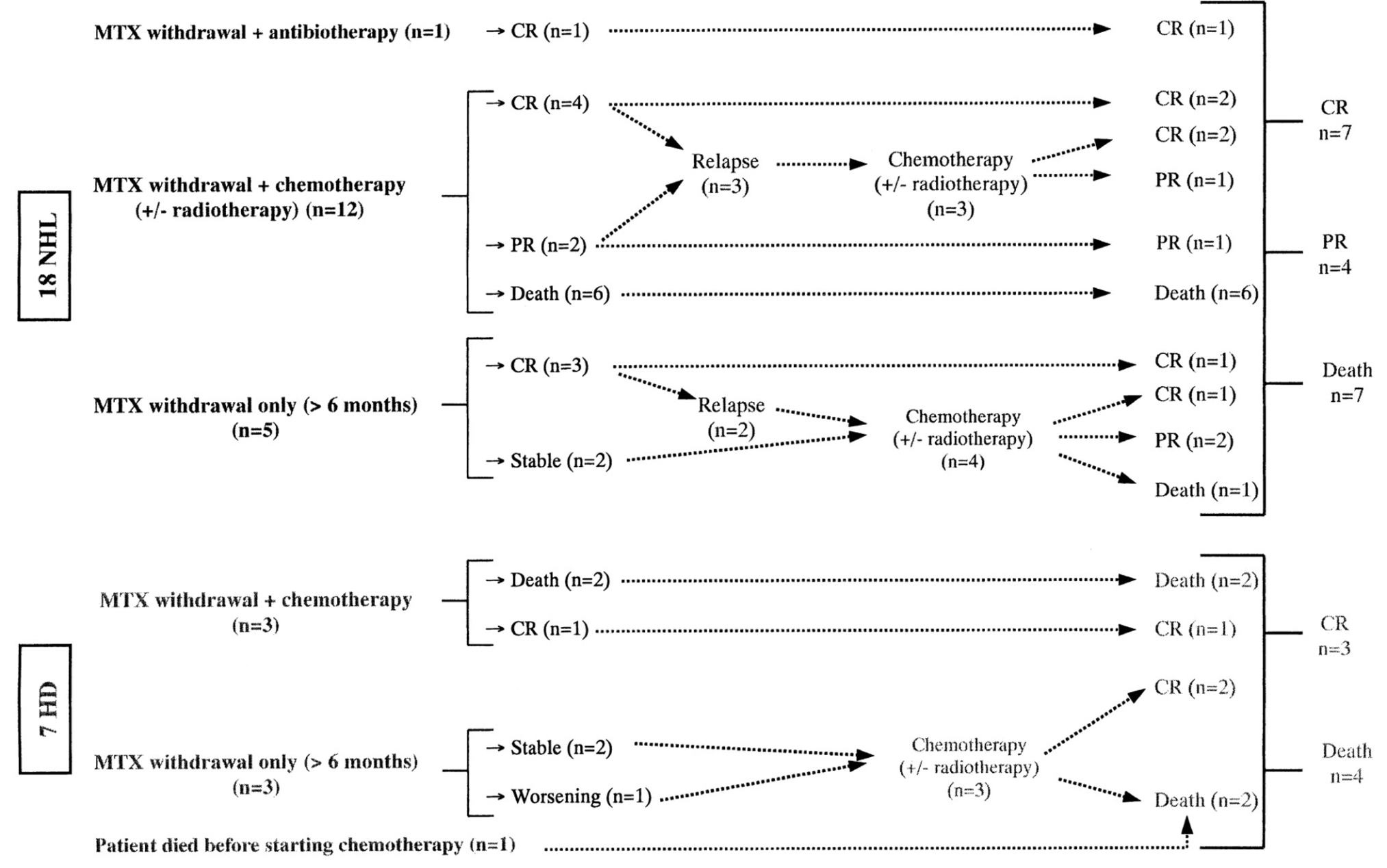A Safer Path: Dietary Supplements as an Alternative to Methotrexate for Managing Rheumatoid Arthritis in Adults

Is enduring cancer a preferable tradeoff for chronic, severe pain? Rheumatoid arthritis is an autoimmune disorder that causes extreme joint pain and inflammation. Treatment options for this disorder are methotrexate, an immunosuppressant drug, and dietary supplements. The use of methotrexate is associated with potentially life-threatening side effects such as lymphoma, a form of blood cancer that affects the lymphatic system. By examining a three-year prospective study in France on the occurrence of lymphoma in rheumatoid arthritis patients taking methotrexate, this paper aims to establish an association between methotrexate and the development of lymphoma in individuals with rheumatoid arthritis. Doing so opens the door to considering dietary supplements, despite specific warnings, as a safer alternative option for managing the symptoms of this debilitating disorder before opting for methotrexate.
In investigating the safety of methotrexate, research explores the occurrence of lymphoma in rheumatoid arthritis patients using this medication. Toyonaga et al. (2019) documented a case concerning a seventy-year-old woman diagnosed with diffuse large B-cell lymphoma of the stomach and duodenum. Diagnosis relied on medical test results, revealing lesions in the digestive tract and elevated sIL-2R levels, along with the patient’s history of methotrexate use for her rheumatoid arthritis. Her doctors advised her to discontinue methotrexate, resulting in a temporary decline of the methotrexate-associated lymphoma.
Chemotherapy commenced when the lymphoma became more severe, leading to the woman’s official remission a year after treatment. Hirose et al. (2002) reported a similar instance involving a seventy-year-old Japanese man with stage four, class two rheumatoid arthritis who developeddiffuse large B-cell non-Hodgkin’s lymphoma a few months into methotrexate treatment. Despite temporary remission after chemotherapy, the lymphoma recurred three months later, leading to the patient’s death. These case studies stress the importance of exploring safer alternative options for managing rheumatoid arthritis before resorting to potentially harmful measures like methotrexate.
As research continues to explore the safety of methotrexate at the individual level, a three-year prospective study in France estimated the risks involved in developing lymphoma from taking methotrexate for rheumatoid arthritis at the country-wide level. In 1995, the Club Rhumatismes et Inflammation, a subcommittee of the French Society of Rheumatology, began this study with the collection of all the methotrexate-associated lymphoma cases in French rheumatoid arthritis patients over the years 1996, 1997, and 1998. During these three years, sixty-one rheumatology departments in France provided the researchers with all the new lymphoma cases involving French rheumatoid arthritis patients treated with methotrexate. At the end of the three years, this study documented twenty-five methotrexate-associated lymphoma cases out of the French population, with eighteen non-Hodgkin’s lymphoma and seven Hodgkin’s disease cases. In estimating the risk of rheumatoid arthritis patients developing lymphoma from methotrexate as compared to the general population, the researchers concluded that there is an increased overall risk of Hodgkin’s disease. However, in regards to non-
Hodgkin’s lymphoma, the researchers concluded that the risk of developing it “was not significantly increased in rheumatoid arthritis patients treated with methotrexate” (Mariette et al., 2002). However, there is likely a link to its occurrence with methotrexate. Although the chance of getting lymphoma from methotrexate is low, there is still a risk involved in developing lymphoma when taking this medication for rheumatoid arthritis. In exploring the gravity of methotrexate-associated lymphoma, the three-year prospective study conducted in France examined the outcomes of twenty-five cases involving rheumatoid arthritis patients who developed lymphoma due to methotrexate, shown in Figure 1. Treatment options for those diagnosed with methotrexate-associated lymphoma include methotrexate withdrawal or withdrawal along with chemotherapy. Among the eighteen non-Hodgkin’s lymphoma cases, seven achieved complete remission, four had partial remission, and seven
patients died. For the seven Hodgkin’s disease cases, three gained complete remission, and four patients died, with one of the four dead patients passing away before starting chemotherapy. This evidence indicates that in being diagnosed with lymphoma, there is a chance of overcoming it, living with it, and dying from it. Besides the two non-Hodgkin’s lymphoma patients who achieved complete remission from methotrexate withdrawal alone, the remaining twenty-three methotrexate-associated lymphoma cases had to undergo chemotherapy, with three patients needing to go through chemotherapy a second time after a relapse. Considering the commonality of the patients undergoing chemotherapy treatment versus methotrexate withdrawal alone, this demonstrates the risks involved in the unfavorable treatment option of chemotherapy for fighting lymphoma. The diagram below displays the study conducted by Club Rhumatismes et Inflammation in which eleven out of twenty-five patients with methotrexate-associated lymphoma died. This statistic emphasizes a potentially grim outcome despite treatment efforts for individuals with rheumatoid arthritis who develop lymphoma from methotrexate.

Figure 1: Methotrexate-Associated Lymphoma Patient Outcomes
Note: Follow-up and outcome of the twenty-five methotrexate-associated lymphomas in rheumatoid arthritis patients in which eleven out of twenty-five patients with methotrexate-associated lymphoma died. Mean thirty-four months (25-54). CR indicates complete remission; PR, partial remission; NHL, non-Hodgkin’s lymphoma; HD, Hodgkin disease.
As opposed to methotrexate and its side effects, an alternative treatment option of dietary supplements can be considered. Dietary supplements are not approved by the Food and Drug Administration and are required by law to deny any intent to treat, cure, or prevent diseases. However, despite these limitations, they can play a supporting role in naturally managing the symptoms of certain disorders. In examining the efficacy of dietary supplements for symptom management, six specific supplements have demonstrated proven benefits for individuals with rheumatoid arthritis. These supplements are Boswellia serrata, curcumin, omega-3 fish oil, cat’s claw, bromelain, and methylsulfonylmethane. Given that rheumatoid arthritis involves joint pain and inflammation, these dietary supplements mainly target the root causes of those symptoms: inflammatory enzymes, cytokines, and prostaglandins. For example, Boswellia serrata blocks the enzyme 5-lipoxygenase, preventing the breakdown of polyunsaturated fatty acids into
inflammatory molecules known as leukotrienes, which can attack joints (“Supplement and Herb Guide for Arthritis Symptoms,” n.d.). Cat’s claw, on the other hand, inhibits the inflammatory cytokine called tumor necrosis factor. Similarly, curcumin, bromelain, and omega-3 fish oil effectively block sources of inflammation, with the pain-relieving effects of bromelain and omega-3 fish oil comparable to nonsteroidal anti-inflammatory drugs (NSAIDs). Notably, studies on omega-3 fish oil suggest its effectiveness in reducing joint pain, inflammation, and stiffness in rheumatoid arthritis patients to be so significant that, in some cases, it can serve as a potential alternative to NSAIDs (Rennie et al., 2003). This effectiveness is particularly remarkable, given that rheumatologists commonly prescribe NSAIDs to rheumatoid arthritis patients. In contrast to dietary supplements that block sources of inflammation, methylsulfonylmethane relieves joint pain by reducing nerve impulses that transmit pain. Overall, these supplements offer rheumatoid arthritis patients a safer yet still effective alternative option for managing symptoms.
While these dietary supplements offer a safer alternative treatment option for managing rheumatoid arthritis, they are not without warnings, like prescription medications. For instance, individuals on blood thinners should exercise caution before considering taking these specific supplements, as the effects of the blood thinners may increase. In particular, Boswellia serrata not only has the potential to enhance the effects of blood thinners but may also increase the side effects of other drugs and stimulate the immune system. Regarding consumption warnings, individuals who are pregnant, preparing for surgery, or have gallbladder disease should refrain from taking curcumin. Similarly, individuals diagnosed with tuberculosis or those taking anti-hypertensive medications or immunosuppressants should avoid consuming cat’s claw. Regarding physical side effects, both bromelain and methylsulfonylmethane, may lead to an upset stomach and diarrhea, while cat’s claw could lower blood pressure and induce headache, dizziness, and vomiting. Despite the side effects associated with dietary supplements, it is essential to note that these effects are generally not life-threatening when compared to the risks associated with methotrexate, which has the potential to cause lymphoma to develop in rheumatoid arthritis patients.
Before consuming any dietary supplements, just like new medications, it is essential to consult a healthcare professional to discuss and understand possible side effects and how they could interact with certain drugs. It is important to note that not all doctors are well-trained in complementary and alternative medicine, potentially limiting their advice on dietary supplements as an alternative treatment option for rheumatoid arthritis. However, seeking their guidance on the safety of certain supplements is essential before considering taking them. Despite the perception of dietary supplements as natural, some manufacturers may list ingredients on the label that do not match the actual contents of the supplement. Since the Food and Drug Administration does not regulate dietary supplements, it is crucial to choose well-known brands available online through platforms like Amazon or in-person at reliable distributors such as drug stores like Walgreens, specialty nutrition stores like The Vitamin Shoppe, or health food stores like Whole Foods. While dietary supplements may prove effective for some individuals in managing rheumatoid arthritis symptoms, their efficacy varies. For instance, if an individual with rheumatoid arthritis observes minimal improvement after several months of taking specific dietary supplements for this autoimmune disorder, it may signal the need to explore other treatment options, including the last resort option methotrexate, even though it comes with the risk of lymphoma.
In conclusion, while the immunosuppressant drug methotrexate stands as the conventional and most effective treatment option for managing rheumatoid arthritis, it is associated with deadly side effects, such as lymphoma. Current research investigating the development of lymphoma in rheumatoid arthritis patients using methotrexate, along with the insights gathered from a three-year French prospective study, collectively establish a low but clear risk of methotrexate-associated lymphoma in this patient population. Given this potential risk, dietary supplements emerge as a safer alternative for addressing rheumatoid arthritis symptoms without exposing patients to the deadly side effects associated with methotrexate.
Thus, the key takeaway is that there is no genuine harm in considering dietary supplements as an initial approach to managing rheumatoid arthritis before resorting to a potentially life-threatening drug like methotrexate.
Sources
Arthritis Foundation. (n.d.). Choosing supplements wisely. https://www.arthritis.org/health-wellness/treatment/complementary- therapies/supplements-and-vitamins/choosing-supplements-wisely.
Arthritis Foundation. (n.d.). Rheumatoid arthritis: causes, symptoms, treatments and more. https://www.arthritis.org/diseases/rheumatoid-arthritis.
Arthritis Foundation. (n.d.). Supplement and herb guide for arthritis symptoms. https://www.arthritis.org/health-wellness/treatment/complementary- therapies/supplements-and-vitamins/supplement-and-herb-guide-for-arthritis-symptoms.
Hirose, Y., Masaki, Y., Okada, J., Chang, G. K., Kawabata, H., Ogawa, N., Wano, Y., & Sugai, S. (2002). Epstein-barr virus-associated B-cell type non-hodgkin’s lymphoma with concurrent p53 protein expression in a rheumatoid arthritis patient treated with methotrexate. International Journal of Hematology, 75(4), 412-415. https://doi.org/10.1007/BF02982134.
Mariette, X., Cazals-Hatem, D., Warszawki, J., Liote, F., Balandraud, N., Sibilia, J., & Investigators of the Club Rhumatismes et Inflammation. (2002). Lymphomas in rheumatoid arthritis patients treated with methotrexate: A 3-year prospective study in France. Blood, 99(11), 3909-3915. https://doi.org/10.1182/blood.V99.11.3909.
Rennie, K. L., Hughes, J., Lang, R., & Jebb, S. A. (2003). Nutritional management of rheumatoid arthritis: a review of the evidence. Journal of Human Nutrition and Dietetics, 16(2), 97-109. https://doi.org/10.1046/j.1365-277X.2003.00423.x.
Toyonaga, H., Fukushima, M., Shimeno, N., & Inokuma, T. (2019). Methotrexate-associated lymphoproliferative disorder in the stomach and duodenum: A case report. BMC Gastroenterology, 19(1), 62-62. https://doi.org/10.1186/s12876-019-0982-4.
U.S. National Library of Medicine. (2017). Methotrexate: medlineplus drug information. MedlinePlus. https://medlineplus.gov/druginfo/meds/a682019.html.

